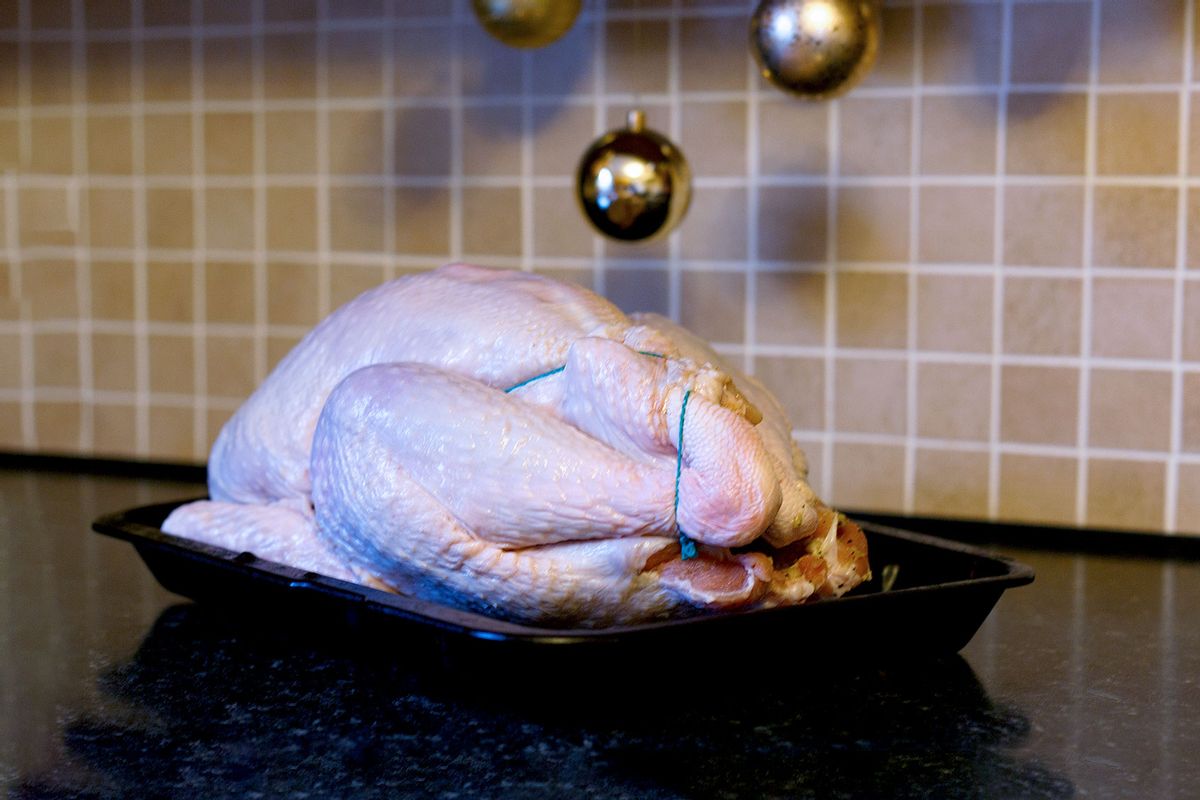For many people, eating raw or undercooked meat sounds unappetizing. However, some food subcultures around the world do consume raw meats as part of their cuisine. When it comes to raw turkey specifically, there are some significant health hazards to consider before taking a bite.
Why You Should Not Eat Raw Turkey
Raw turkey poses a higher risk for foodborne illness than other types of poultry and meat That’s because raw turkey can harbor dangerous pathogens including Salmonella, Clostridium perfringens, and Campylobacter
Salmonella is one of the most common causes of food poisoning from turkey. The CDC estimates salmonella causes over 1 million foodborne illnesses annually in the U.S Symptoms include diarrhea, abdominal cramps, fever, and vomiting Severe cases may even require hospitalization.
Clostridium perfringens is another bacterium found in raw turkey and other meats. When ingested, C perfringens releases toxins that provoke diarrhea and abdominal cramping
Campylobacter is another problematic pathogen that can lead to diarrhea, cramping, nausea, and vomiting if consumed through raw turkey. In some cases, Campylobacter can produce more serious illnesses like Guillain-Barre syndrome or reactive arthritis.
Beyond harmful bacteria, raw turkey may also contain dangerous parasites, viruses, and environmental contaminants. The risks clearly outweigh any potential benefits of eating raw turkey.
How to Cook Turkey Safely
Proper cooking is essential for consuming turkey safely. Here are important guidelines for cooking whole turkeys, breasts, thighs, ground turkey, and other preparations:
-
Cook turkey to an internal temperature of 165°F as measured by a food thermometer. Use a thermometer to check the innermost part of the thigh, wing, and thickest area of the breast.
-
Allow the cooked turkey to rest for 15 minutes before carving to allow the temperature to rise further.
-
Do not partially cook turkey or eat it rare or medium-rare. Partial cooking can encourage bacterial growth.
-
Cook stuffing to 165°F as well, either inside the turkey or separately.
-
Refrigerate all leftovers within 2 hours and reheat thoroughly before eating again.
-
Always thaw frozen turkey slowly in the refrigerator, never at room temperature. Cook thawed turkey immediately.
Following proper food safety principles is key to preventing illness from turkey. This includes diligent hand hygiene, preventing cross-contamination, and monitoring cooking temperatures.
Safer Alternatives to Raw Turkey
For those who want to consume turkey in a raw or rare form, there are some safer options:
-
Choose pre-cooked turkey products like lunchmeat. Opt for sealed, sliced packages rather than deli counters.
-
Make turkey tartare from pre-cooked turkey, diced/minced finely and mixed with seasonings.
-
Consider plant-based fake meat products that mimic the texture and flavor of raw turkey.
-
Try other raw meat alternatives like steak tartare made from quality beef.
-
Marinate seafood like fish or shrimp in citrus juice for ceviche, which uses an acidic marinade to “cook” the proteins. This technique does not apply to poultry.
What to Do if You Eat Raw Turkey
If you accidentally ingest raw or undercooked turkey, monitor yourself closely for symptoms of foodborne illness over the next few days. Nausea, diarrhea, fever, and chills are common signs. Make sure to drink plenty of fluids to prevent dangerous dehydration.
Seek medical attention promptly if symptoms are severe or if you are in a high-risk group like pregnant women, young children, elderly, or immunocompromised individuals. Food poisoning can become serious very quickly for those populations.
You should also report the incident to the USDA Meat and Poultry Hotline at 1-888-MPHotline so they can investigate the source of contamination. This helps prevent future outbreaks.
Key Takeaways
Raw turkey can harbor hazardous bacteria like Salmonella, so it should never be consumed raw or undercooked. Always cook turkey thoroughly to 165°F as measured by a food thermometer. Follow proper handling, cooking, and storage guidelines to prevent foodborne illness. While raw turkey is risky, cooked turkey can be enjoyed safely with the right precautions.

Besides normal stuffing, your turkey is stuffed with salmonella, campylobacter and E. coli, too

Tomorrow, millions of Americans will do something they only do once a year: cook a turkey. Since cooking isn’t something most people do every day, even experienced cooks often make mistakes during the process. For example, they might forget to take the plastic-wrapped giblets out of the turkey’s cavity, cook it too long and burn it, or, even worse, cook it too little and make it tough.
Why is undercooking a turkey such a problem? Notably, it is far easier to undercook a turkey than, say, smaller, more often-cooked poultry like chicken or duck. And while overcooking means the turkey may be partly inedible, it also means that any residual pathogens — meaning bacteria or the like — have undoubtedly died. Not so with undercooking. If you fail to prepare your turkey correctly, you may wind up ingesting some very scary pathogens. In 2018, one person died and over a hundred became ill due to a salmonella outbreak linked to raw turkey.
“Some of the juices from the raw meat may potentially cause food-borne illnesses or other bacterial issues.”
Salmonella certainly isnt the only concern. Many diseases can be found in raw turkey meat, so it’s not just a good idea to cook it safely; it’s a must if you want to keep everyone at the Thanksgiving table safe.
There are many pathogens that can infect a turkey. Here is a list of some of them, along with how to avoid them and what you can do to make sure your Thanksgiving bird is clean and cooked correctly. A piece of advice: get a good meat thermometer. Cooking a turkey to a safe minimum temperature all the way through is the best way to avoid many of these problems.
E. coli
The bacteria Escherichia coli is better known by its short name, E. coli. If you are an animal or a human, the chances are that E. coli live inside your intestines. Dont worry, though: Most strains of E. coli are harmless, or at least cause nothing more than an upset stomach and mild diarrhea. If you accidentally ingest E. coli from undercooked turkey, however, and it is a dangerous strain like E. coli O157:H7, you could be in trouble. Symptoms of severe E. coli infections include severe stomach cramps, nausea, vomiting and diarrhea.
Want more health and science stories in your inbox? Subscribe to Salons weekly newsletter The Vulgar Scientist.
Salmonella
According to the Centers for Disease Control and Prevention (CDC), roughly 400 people die every year from salmonella poisoning, while an estimated 26,000 are hospitalized. Salmonella is passed by birds from one to the other in countless ways, from their nesting to their feeding habits.
If youre talking about turkeys, however, there is a specific salmonella strain that is most common: the Reading strain. When a Salmonella Reading outbreak occurred in 2018, it led to one fatality and 132 hospitalizations, with experts suspecting that it was accidentally introduced to the turkey supply chain and spread nationally before being identified by Minnesota officials.
Like E. coli, salmonella includes gastric symptoms like severe stomach cramps, nausea, vomiting and diarrhea. Infected patients may also experience bloody stools, chills and fevers. However, cooking your turkey to an internal temperature of at least 165 degrees Fahrenheit should make it safe from salmonella. There have been recent salmonella outbreaks from California (where it was linked to raw salmon) to Israel (where it was linked to chocolates).
Campylobacter
From Illinois to New York City, campylobacter outbreaks happen all the time; the CDC refers to campylobacter as “the most common bacterial cause of diarrheal illness in the United States.” The term campylobacter refers both to the disease itself and the bacterium which causes it. It leads to gastroenteritis, nausea, diarrhea, fevers and other ailments in people that can ultimately be fatal. Campylobacter is often shed through the feces of infected animals like turkey, but can exist in the meat as well.
The CDC refers to campylobacter as “the most common bacterial cause of diarrheal illness in the United States.”
While the symptoms of campylobacter infection (as with the other illnesses discussed here) are primarily gastric (nausea, cramps, diarrhea), they can also become far more severe: Temporary paralysis, arthritis and even spreading to the bloodstream to cause more serious infections. Fortunately, cooking your turkey to an internal temperature of at least 165 degrees Fahrenheit should kill any wayward bugs in your meat.
How to properly prepare your turkey
“Cook your turkey to 165 degrees Fahrenheit” has come up a lot, as you may have noticed. When it comes to keeping your turkey safe, that temperature seems to work no matter which of these three pathogens it has or something else.
Yet cooking your turkey to an internal temperature of 165 degrees Fahrenheit is not always enough. I recently read in Salon that defrosting a frozen turkey in the fridge is best because “the temperature is controlled, defrosting can be gradual and consistent, and you can collect any residual defrosting moisture or liquids in a large roasting rack, sheet tray, or wherever you were planning to actually cook your turkey.” Allow 24 hours for every 4 to 5 pounds of turkey you have to defrost. People often put the turkey in cold water to cook it. If you do this, make sure to change the water every 30 minutes, keep the turkey in its original wrapping, and don’t just leave the turkey naked in the sink.
La Corte says, “Some of the juices from the raw meat could possibly cause food-borne illnesses or other bacterial problems.” “Lets try to stay as far away from those as possible. “.
Matthew Rozsa is a staff writer at Salon. He graduated from Rutgers-Newark with a Master’s in History in 2012 and was given a science journalism fellowship by the Metcalf Institute in 2022.
Can you eat slightly raw turkey?
FAQ
Is it safe to eat uncooked turkey?
Is slightly pink turkey ok to eat?
Is turkey safe to eat rare?
Can you eat ground turkey medium rare?
Can turkeys eat raw meat?
I mentioned earlier that turkeys are omnivores, which means they can eat plants and animal meat. You should however not feed your turkeys raw meat. Uncooked meat may contain bacteria that is harmful to your turkeys. Make sure meat is well cooked before feeding it to your turkeys to avoid illnesses. ✓ Uncooked beans.
Can one have turkey and carrots?
Eating turkey and carrots is part of healthy habits. The turkey has meat like chicken and is another healthy poultry option. Carrots are rich in carotenoids, it is a source of vitamin A, fiber, potassium and vitamin B3.
Is it safe to cook raw turkey?
Raw turkey can contain Salmonella, Clostridium perfringens, Campylobacter, and other germs. It is important to take special care when handling and cooking a turkey to prevent food poisoning. Here are the 6 steps to safely store, thaw, handle, cook, and reheat your turkey: 1. Store raw turkey properly.
Can I eat raw ground turkey if I have an illness?
Individuals concerned about an illness should contact their health care provider. FSIS advises all consumers to safely prepare their raw meat products, including fresh and frozen, and only consume raw ground turkey that has been cooked to a temperature of 165°F.
Can dogs eat raw turkey?
Dogs have no problem eating cooked or raw turkey meat, the turkey’s neck, feet, turkey giblets, bone broth, and organ meats. In fact, these foods are actually good for them and provide many health benefits, so feel free to feed your dog a variety of these poultry products. Wait, what about avoiding human foods?
Can turkeys eat red meat?
Iron. Red meat like beef, goat etc. are rich in iron. Eating this type of meat is good for turkeys as it supplies them with the needed iron required for their health. A deficiency in iron causes anemia which is a serious condition that can lead to death if not treated immediately.
